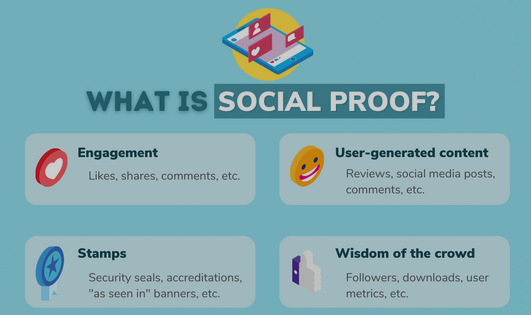Social proof is a psychological phenomenon where people rely on the opinions, actions, and feedback of others to make decisions. In the context of online sales, social proof plays a crucial role in influencing potential customers and boosting confidence in their purchase decisions. Here are key ways in which social proof contributes to online sales:

Building Trust:
Social proof helps build trust by showcasing that others have had positive experiences with a product or service. Customer reviews, testimonials, and ratings provide evidence that the product or service is reliable and meets customer expectations.
Increased Credibility:
When potential buyers see that a product or service has been endorsed by others, it enhances the credibility of the offering. Influencers, industry experts, or well-known personalities recommending a product can significantly impact how it is perceived by the audience.
Validation of Choices:
Social proof validates the choices of potential customers. When they see that others with similar needs or preferences have made a positive decision, it helps reassure them that they are making a wise choice.
Influencing Perceptions:
Positive social proof influences the perception of a product or brand. Seeing positive comments, likes, shares, or endorsements on social media platforms can create a positive image, making the product more appealing to potential customers.
Encouraging User Engagement:
Social proof can encourage user engagement through comments, likes, shares, and user-generated content. When people actively participate in discussions or showcase their experiences, it adds authenticity to the brand and encourages others to engage as well.
Reducing Perceived Risk:
Potential customers often perceive purchasing a product online as risky, especially if they haven’t physically seen or tried it. Social proof helps reduce this perceived risk by providing evidence that others have successfully used and enjoyed the product.
Word-of-Mouth Marketing:
Social proof serves as a form of digital word-of-mouth marketing. Recommendations from friends, family, or online communities have a powerful impact on consumer decisions. Positive experiences shared by real people can drive organic growth and sales.
Creating a Sense of Community:
Brands can leverage social proof to create a sense of community around their products or services. When customers feel connected to a community that shares similar interests or experiences, it fosters a sense of belonging and strengthens brand loyalty.
Showcasing Popularity:
Highlighting the popularity of a product through metrics like the number of purchases, downloads, or subscribers can create a sense of urgency and FOMO (Fear of Missing Out). When potential customers see that a product is in high demand, it can influence them to make a purchase sooner.
Diversifying Social Proof Sources:
Utilizing a variety of social proof sources adds authenticity and credibility. This includes customer testimonials, reviews on third-party platforms, social media endorsements, and user-generated content. A diverse range of social proof reinforces the positive image of the brand.
In conclusion, social proof is a powerful tool in online sales that helps establish trust, credibility, and confidence in potential customers. By leveraging the experiences and opinions of others, businesses can create a persuasive environment that influences purchasing decisions and contributes to overall sales success.
